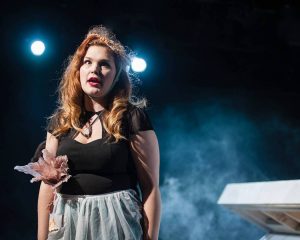
Can a temptress like Sabina bring about the collapse of civilization, or is that question flat-out sexist? (Photo of Erin Palm by Ross den Otter)
It’s easy to see why Thornton Wilder’s The Skin of Our Teeth was hailed as a great work when it premiered in 1942. And it’s easy to see why director Sarah Rodgers would choose to stage it in 2018. But that doesn’t mean it’s worth watching for two and a half hours.
The Skin of Our Teeth is a deliberately allegorical—and often comic—examination of the perpetual human cycle of tragedy and resilience. And it’s chock full of anachronisms. Although the play’s vernacular places the action in the forties, Mr. and Mrs. Antrobus are clearly Adam and Eve. “Antrobus” is derived from the Greek anthropos, which means “human” or “person”. And, in a little aside, Mrs. Antrobus, whose name is Maggie, is slyly referred to as Eva. She’s not the only family member who has undergone a name change either. Her son Henry was called Cain until that unfortunate incident with Abel.
In the first of the play’s three acts, the Antrobus clan is trying to stave off the Ice Age. Mr. Antrobus is busily at work inventing the wheel, the alphabet, and the multiplication tables. But, as a wall of ice descends from Canada, refugees start arriving at the Antrobus family home in suburban New Jersey, and the pet mammoths and dinosaur are getting decidedly chilly. In Act 2, which is set on the boardwalk in Atlantic City, the family’s survival is threatened by a great flood—and by Mr. Antrobus’s dalliance with a beauty queen. Then, in Act 3, we’re back at the Antrobus house. A seven-year war has finally ended.
There’s a fair bit of wit in the script. In Act 1, for instance, Sabina, the maid, says that it’s so cold in New Jersey that the dogs are sticking to the sidewalks. And the anachronisms are amusing, but I doubt they carry a fraction of the impact they would have wielded in 1942, when such breaks with naturalism would have been shocking. The same goes for the metatheatrical moments. Throughout the play, Sabine stops the action—to complain that she doesn’t understand a word of the script, for instance.
The play’s gender politics are appalling, especially in the second act, when Sabina becomes Lily. Both names are problematic. Sabina refers to the rape of the Sabine women. In asides from Mr. Antrobus, this is treated as a joke. The name Lily refers to Lilith, the sexual temptress of Judeo-Christian lore.
In Act 2, the threat to humanity is female sexuality, as embodied by the beauty queen. And the play equates humanity with the heterosexual nuclear family. The assigned defender of that family is Mrs. Antrobus, who, while her husband has been inventing the wheel and the lever, has been inventing the apron.
Of the three acts, the final one is my favourite, especially the closer in which philosophers from Plato to Spinoza chime in with words of encouragement. Still, I find it hard to buy into the play’s fundamental buoyancy. Yes, the script’s concerns with climate change, refugees, and war resonate in 2018, but George Antrobus’s optimism that our books—our philosophy and art—will save us doesn’t.
Still, director Rodgers and her cast give the script a solid go. The velvet-voiced Erin Palm does a neat job of negotiating Sabina’s transitions and Mallory James makes a convincingly no-nonsense Mrs. Antrobus. I was also taken by Dan Swain’s Henry, who grows from baffled kid to vicious adult.
Rodgers’s use of songs and commercials from the period suits the vaudevillian, almost improvisational nature of the text. And Emily Cooper’s projections of animated collages are witty.
The placement of David Roberts’s set makes those projections hard to see, but the set is also innovative and reflective of the play’s philosophy.
In Acts 1 and 3, Roberts gives us the angled roof and dormer window of a Craftsman-style house. In Act 1, it feels like the house has been knocked over and is three-quarters buried in snow; the Antrobus family has to enter and exit through the upstairs window. In the intermission between Acts 1 and 2, cast members efficiently reconstruct the whole thing, turning the angled roof into a sloped boardwalk. This mini feat of engineering speaks eloquently to the notion of human resourcefulness.
If only it were easier to believe that, this time around, our resourcefulness will outpace our stupidity.
THE SKIN OF OUR TEETH By Thornton Wilder. Directed by Sarah Rodgers. A Studio 58 production at Studio 58 on Wednesday, February 7. Continues until February 18.
NEVER MISS A REVIEW: To get the best of my theatre writing, including my reviews, once a week, sign up for my newsletter. It’s free! And there will be contests and prizes—including theatre tickets.





0 Comments